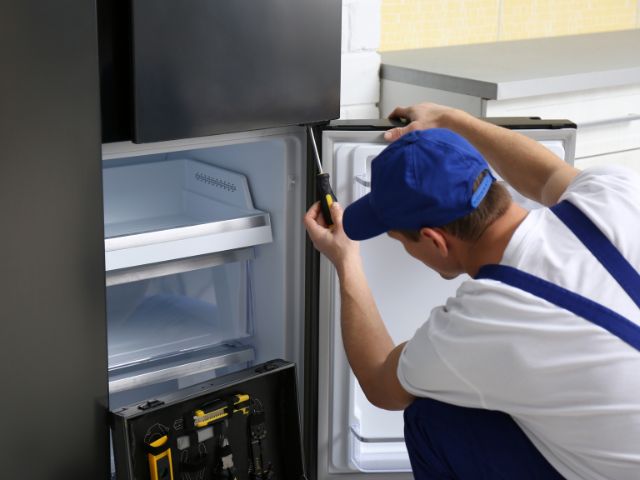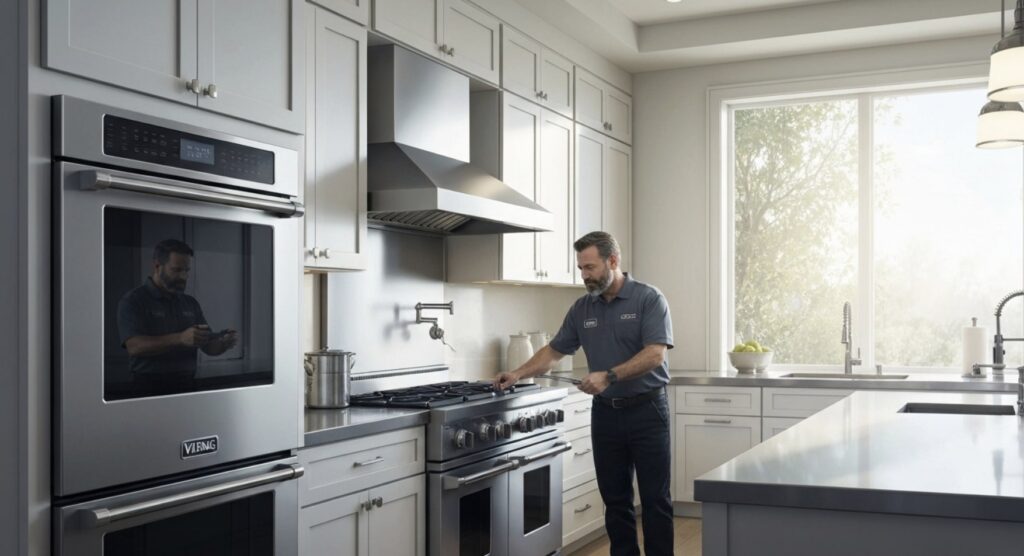Dealing with a broken dishwasher can be really annoying. You may wonder if you should buy a new dishwasher or fix your current dishwasher. In this article, we will explore the factors you should consider when deciding whether to repair or replace an old dishwasher. From cost comparison to energy efficiency, we’ll provide you with all the information you need to make an informed decision that suits your needs and budget. Let’s dive into the details of this important household dilemma.
Understanding Your Dishwasher’s Life Cycle
Just like any appliance, your Viking dishwasher has a natural life cycle. Knowing more about this cycle can help you choose to fix it or buy a new one. When you use it often, parts can wear down, and your dishwasher may not clean as well as it used to.
Recognizing the Signs of Wear and Tear
Wear and tear is something that happens to every appliance over time. Dishwashers often deal with water, heat, and detergent. This can wear down their parts as time goes by.
A common sign of wear and tear is when cleaning performance starts to drop. If your dishes are not getting clean like they used to, even after you clean the filter, it might mean a bigger problem is coming.
Also, pay attention to any strange noises while your dishwasher is running. Sounds like grinding, squealing, or rattling could show there are issues with the motor, pump, or other parts inside.
The Average Lifespan of a Dishwasher
The average lifespan of a dishwasher can vary depending on several factors, including brand, usage frequency, and maintenance. However, on average, a well-maintained dishwasher can last anywhere between 9 to 15 years.
Beyond this timeframe, the likelihood of major component failures increases, potentially leading to costly repairs. Here’s a general guideline:
|
Age Range |
Recommendation |
|
Less than 5 years |
Repair is usually the most cost-effective option. |
|
5-9 years |
Consider the severity and cost of repairs before deciding. |
|
9+ years |
Replacement might be a more practical choice. |
Keep in mind that these are just averages, and your dishwasher’s actual lifespan may differ.
Evaluating the Cost: Repair vs. Replacement
When your dishwasher is not working, you have to decide whether to repair it or replace it. This often comes down to cost. It’s important to think about the costs for both options before you decide.
Repairing your dishwasher may look like a cheap choice at first. But, if you have to fix it many times, the costs can add up fast. This is especially true if the appliance is old. On the other hand, buying a new dishwasher costs more at the start. However, it offers a warranty and the newest technology.
When Is Repairing Your Dishwasher Worth It?
Repairing your dishwasher can save you money in some cases. If the problem is small, like a blocked filter or a broken door latch, the repair costs may be low.
Also, if your dishwasher is new and still has a warranty, repairs could be free. This makes fixing it a smart choice. However, if your dishwasher is old and needs repairs often, it may be time to replace it.
Spending money on an old appliance can cost you more over time than just buying a new one.
Calculating the Cost of Replacement
Determining the cost of replacement is not just about the price of a new dishwasher. You also need to think about other costs. This includes installation fees, delivery charges, and any updates to your kitchen plumbing or electrical work.
It’s important to consider these extra costs to get a true idea of the total replacement cost. By researching different dishwasher models, their features, and their prices, you can make a smart choice that fits your budget and needs.
Keep in mind that choosing a more energy-efficient model may cost more at first. However, this can provide big savings on your utility bills later on.
Beginner’s Guide to Diagnosing Dishwasher Problems
Before calling a technician, you can try to find out some common issues with your dishwasher by yourself. This may save you money and help you understand your appliance better.
Start by looking at the user manual that came with your dishwasher. It usually has a troubleshooting section that talks about common problems and their solutions.
Simple fixes, like cleaning the filter, checking the spray arms for clogs, or making sure the dishwasher gets enough water, can often solve small issues.
Common Dishwasher Issues and Fixes
Many problems with dishwashers come from common issues that are easy to fix. Here are some examples:
- Dishwasher Not Draining: Look for blockages in the filter, drain hose, or garbage disposal (if it is connected).
- Dishes Not Coming Out Clean: Make sure the spray arms are not clogged. Check that you are using the right amount and type of detergent.
- Dishwasher Not Filling with Water: Check the water inlet valve for clogs or kinks in the supply line.
- Dishwasher Leaking: Look for cracks or damage to the door gasket. Check for loose connections or a clogged float switch.
- Dishwasher Making Strange Noises: Grinding noises may mean there is a problem with the motor or pump. Rattling sounds could indicate a loose spray arm or another internal part.
What You’ll Need Before You Start Troubleshooting
Before you start fixing your dishwasher, it’s good to have some key items ready. This will help you find the problem and fix it quicker.
Step 1: Identify the Problem
The first step in fixing any issue with your dishwasher is to clearly identify the problem. You should watch carefully and notice any strange sounds, smells, or how the appliance works.
For example, if your dishwasher is leaking, see where the leak is coming from. Is it from the front, sides, or the bottom? If the dishes are not cleaning well, are they dirty in one spot in the dishwasher?
By collecting a lot of details about the problems, you can figure out the possible causes and fix them more easily. Remember, it is important to accurately identify the problem to find the right solution.
Step 2: Assess the Severity of the Issue
Once you know the problem with your dishwasher, the next step is to check how serious it is. You need to find out if it’s a small issue or a big problem. This will help you figure out if you can fix it yourself or if you need to call a pro.
For example, if you have a clogged filter or a loose spray arm, these are minor problems that you can probably fix on your own. But, if you think there are issues like a bad motor, pump, or electrical trouble, it’s better to get help from a qualified technician.
Trying to fix complex parts without the right skills and tools can be risky. It can also make the problem worse, which could lead to more expensive repairs later on.
Making the Decision: Repair or Replace?
After looking at everything, the choice to repair or replace your dishwasher is yours. Think about the costs, how old your appliance is, and what you need in the future.
Factors to Consider Before Making a Decision
When deciding whether to repair or replace your dishwasher, there are a few important things to think about. First, check the age of your dishwasher. If it is more than ten years old and breaks down often, buying a new one may save you money in the end.
Next, look at how serious and often the repairs are. Small problems that happen rarely can usually be fixed easily. But if your dishwasher breaks down a lot and needs major repairs, getting a new one may be a better choice.
Also, think about your budget. Look at how much repairs cost compared to buying a new dishwasher. You should consider the price of installing it and any upgrades you might need for utilities.
How Energy Efficiency Affects Your Choice
Energy efficiency plays a crucial role in your decision-making process regarding whether to repair or replace your old dishwasher. Newer models are designed to be more energy-efficient, potentially leading to long-term cost savings on utility bills. When evaluating your options, consider the energy consumption of your current dishwasher versus the potential energy savings of a new, more efficient model. A higher energy-efficient dishwasher not only benefits the environment but also your wallet in the long run.
Implementing Your Decision
Once you’ve thought about your options and made the choice to repair or replace your dishwasher, it’s time to act on that choice.
If you chose to repair, it’s very important to find a skilled and honest appliance repair technician. You can ask friends, family, or neighbors for suggestions. You can also look at online reviews to check the reputation and skills of different services.
If you decided to replace it, research to find a good appliance retailer. Look for one that has many types of dishwashers, fair pricing, and dependable delivery and installation. Take your time to review different models. Think about what you need and what fits your budget to make sure you are happy with your purchase.
How to Find a Reliable Appliance Repair Service
If you need dishwasher repair, it’s important to find a reliable appliance repair service like Viking Appliance Repair Pros for a good experience. Ask your friends, family, or neighbors for recommendations if they have had their appliances repaired recently.
You should also check online review sites like Yelp or Google Reviews. These platforms can help you learn about the reputation and customer satisfaction of different repair companies in your area. After choosing a few options, call them to ask about service charges, availability, and warranties on repairs.
Make sure to check their licensing and insurance to ensure they follow the industry standards and provide good service. A trustworthy repair service will be clear about their prices, explain the problem well, and give a warranty on their work.
Tips for Choosing a New Dishwasher
Choosing a new dishwasher can be fun, but it might also feel a bit tough. There are many different models to choose from, each offering various features. It’s important to think about what you really need and like to help you make the right choice.
First, look at the size and capacity of the dishwasher. You want one that fits your household’s dishwashing needs.
Next, check for energy efficiency. Look for models that are Energy Star-certified. Also, consider the wash cycles and features that fit your habits, like soil sensors, adjustable racks, and options for delaying the start.
Remember, noise levels are important too. This is especially true if your kitchen is open to other living spaces. Pay attention to the decibel rating of the dishwasher. Choosing a quieter model will help keep your kitchen peaceful.
Conclusion
When deciding whether to fix or replace an old dishwasher, it’s important to know its life cycle and look at costs. You should watch for signs of wear and check how much repairs will cost compared to getting a new dishwasher. You also need to think about energy efficiency. A simple guide on finding dishwasher problems can help you make this choice. Once you decide, you can either find a good appliance repair service or pick a new dishwasher. For more details on fixing common dishwasher issues, check out our complete guide on Dishwasher Leak? How to Identify and Fix the Source.
Frequently Asked Questions
How do I know if my dishwasher can be repaired?
You can usually fix simple dishwasher problems by looking for common signs. Check for leaks, strange sounds, or drainage issues. If the problem looks complicated or you don’t know what to do, it is better to talk to a qualified appliance repair technician.
What is the most common problem with old dishwashers?
One common problem with old dishwashers is that their performance goes down. This happens because of wear and tear on parts. You may see this when the dishes do not come out clean, even if you do regular maintenance.
Is it cheaper to repair or replace a dishwasher?
If your dishwasher is cheaper to fix or change will depend on some things. These include how old it is, how much damage there is, and how much the repairs cost. You should look at the costs carefully. Check both options before you decide what to do.







